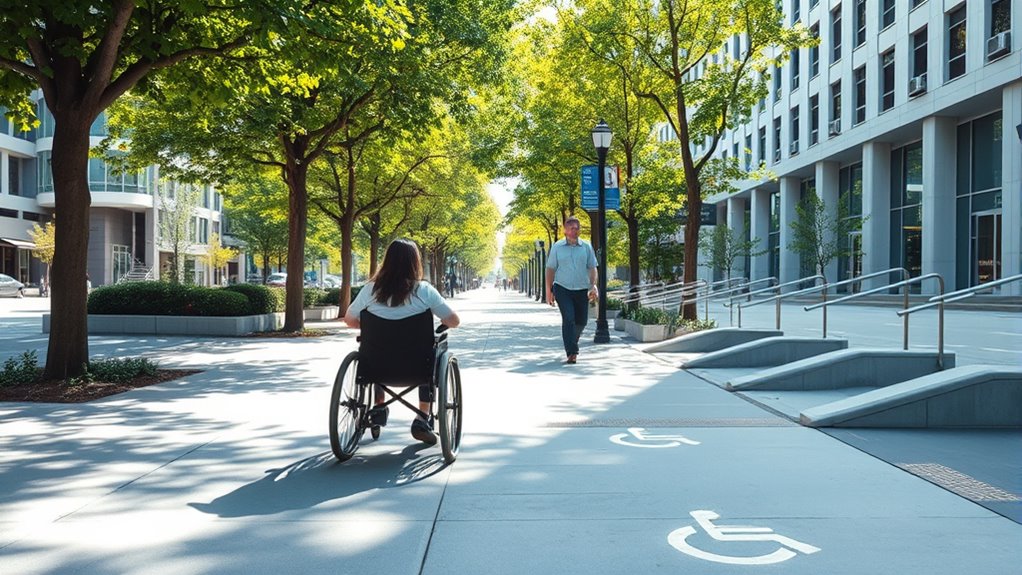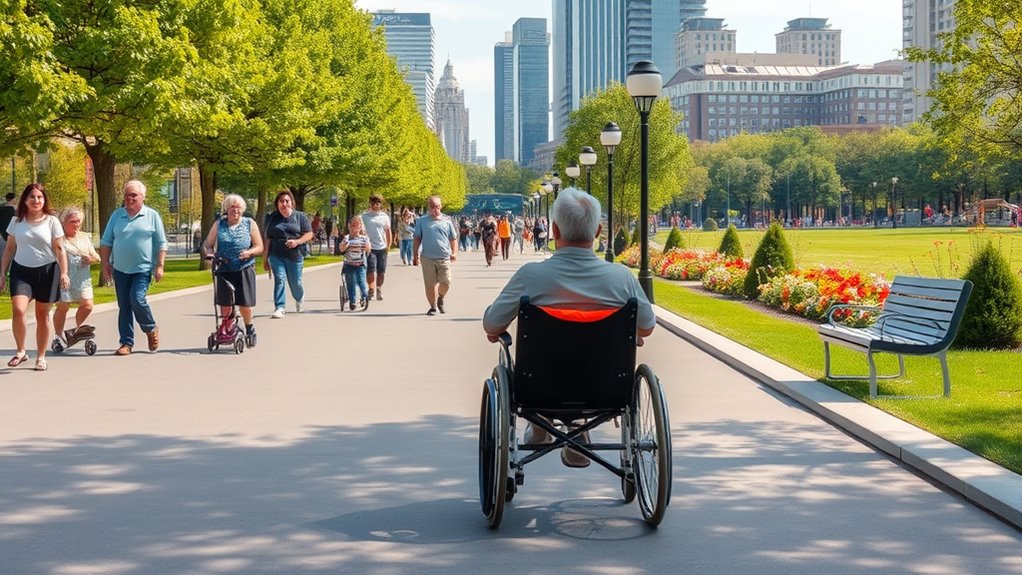To plan accessible travel with mobility concerns, start by researching accommodations with adaptive features like roll-in showers and wider doorways. Identify wheelchair-friendly routes and use apps or maps to navigate easily. Book accessible transportation options such as shuttles or rental cars with hand controls in advance. Confirm specific details with providers to prevent surprises. Proper planning guarantees smooth journeys and enjoyable experiences. Keep exploring to discover helpful tips that make travel more comfortable and inclusive for everyone.
Key Takeaways
- Book adaptive accommodations with accessible features like roll-in showers and wider doorways in advance.
- Use detailed maps and online resources to identify wheelchair-friendly routes and accessible attractions.
- Arrange accessible transportation options, such as wheelchair shuttles or rental cars with hand controls, ahead of time.
- Confirm specific accessibility features with providers to prevent surprises and ensure smooth travel experiences.
- Plan thoroughly by utilizing available resources to create an inclusive, barrier-free itinerary tailored to mobility needs.

Have you ever wondered how accessible travel can open up new adventures for everyone? If you or someone you’re traveling with has mobility concerns, planning becomes essential to ensure a smooth and enjoyable trip. One of the most important aspects is finding adaptive accommodations. These are specially designed to cater to a variety of needs, offering features like roll-in showers, wider doorways, and accessible kitchen counters. When you book accommodations with these amenities, you’re creating a comfortable environment where mobility challenges don’t hinder your experience. Many hotels, resorts, and vacation rentals now list their accessibility features online, making it easier to select options that fit your requirements. It’s worth contacting the property directly to confirm specifics, so you’re not caught off guard upon arrival.
Adaptive accommodations with features like roll-in showers and wider doorways ensure a comfortable, accessible travel experience.
Equally vital are wheelchair friendly routes. Whether you’re exploring a city, visiting a national park, or walking through historical sites, planning routes that accommodate wheelchairs can considerably enhance your journey. Many destinations now offer detailed maps highlighting accessible paths, ramps, and elevators. Utilizing apps or online resources can help you identify wheelchair friendly routes in advance, saving you time and frustration. When you plan your daily itinerary, include these routes to ensure you can navigate without unnecessary obstacles. For example, some city centers have curb cuts and smooth pavements that make moving around much easier. Parks and outdoor attractions increasingly feature accessible trails, allowing you to enjoy nature without worry. Moreover, using accessible vehicle options like adapted transportation can further ease mobility concerns during your trip.
Transport options are another essential consideration. Look for accessible transportation services, such as wheelchair-friendly shuttles or rental cars equipped with hand controls. Booking these in advance guarantees availability and helps you avoid last-minute stress. Many cities now provide accessible public transportation, which can be a cost-effective way to explore. Confirm the accessibility features of taxis or ride-sharing services beforehand, so you can request vehicles with ramps or lifts if needed.
Ultimately, successful accessible travel involves thorough planning and knowing what resources are available. By choosing adaptive accommodations and mapping out wheelchair friendly routes, you set the stage for a trip where mobility concerns don’t hold you back. This proactive approach allows you to focus on the experiences and memories you want to create, rather than obstacles or uncertainties. With the right preparations, accessible travel becomes not just possible but genuinely enjoyable, opening doors to new adventures and perspectives that everyone can appreciate.
Frequently Asked Questions
How Do I Find Accessible Transportation Options at My Destination?
You can find accessible transportation options at your destination by researching local public transit options that offer wheelchair ramps and priority seating. Check city websites or contact transportation authorities for detailed info. Consider rental vehicle accessibility, ensuring the rental company provides adapted vehicles. Also, use travel apps and reviews to identify accessible taxis or ride-sharing services. Planning ahead guarantees smoother travel and helps you navigate your destination comfortably.
What Should I Include in an Accessible Travel Packing List?
Think of your packing list as your travel toolbox. You should include assistive devices like braces, walkers, or wheelchairs, and don’t forget extra batteries or chargers. Bring sufficient medication, along with a schedule for management. Pack essentials such as comfortable clothing, identification, and copies of prescriptions. Consider packing a small first aid kit and any allergy or health-related items. This way, you’re prepared for smooth, confident travels.
Are There Specific Insurance Policies for Travelers With Mobility Issues?
Yes, you should look for travel insurance that offers mobility coverage. These policies specifically protect travelers with mobility issues by covering medical emergencies, equipment damage, or loss, and assistance services. Always read the fine print to make certain the policy includes your specific needs. Shopping around and comparing plans can help you find the best coverage, giving you peace of mind and support throughout your trip.
How Can I Ensure Hotel Rooms Meet My Accessibility Needs?
You can guarantee hotel rooms meet your accessibility needs by checking for specific hotel room features like grab bars, roll-in showers, and wider doorways. Always look for hotels with accessibility certifications, which indicate they meet established standards. Contact the hotel directly before booking to confirm accommodations suit your mobility requirements. Reading reviews from other travelers with similar needs can also help you choose the right room for a comfortable stay.
What Resources Are Available for Emergency Assistance During Travel?
If you need emergency assistance during travel, you should always carry your emergency contact information and any medical assistance details with you. Use local emergency numbers or apps like 911 or your country’s equivalent. Many hotels and airports have on-site medical help and help desks. Download relevant safety apps, and keep emergency contacts saved on your phone. These resources help you get quick support when you need it most.
Conclusion
Planning accessible travel is like paving a smooth road for everyone to enjoy. I once met a traveler who thought her dream trip was impossible until a well-designed wheelchair-friendly route opened new horizons. With over 1 billion people worldwide experiencing some form of mobility challenge, your efforts can turn obstacles into open doors. By prioritizing accessible options, you create journeys where all can explore with confidence—transforming travel from a hurdle into a shared adventure.









